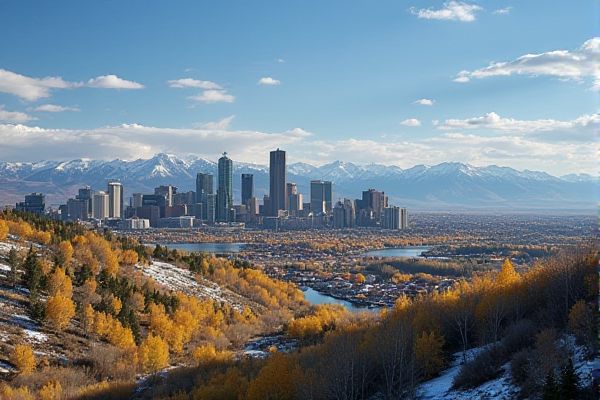
Emergency services and contact information in Colorado: Call 911 for all emergencies. Colorado State Patrol: *CSP (*277) on cell phones. Poison Control Center: 1-800-222-1222. Non-emergency police numbers vary by city. Colorado Office of Emergency Management contact details. Red Cross Colorado Chapter contact information. Local fire department direct contact numbers. Ambulance services details by region. Locate nearest emergency room and hospital. Alert Colorado for emergency notifications.
Call 911 for all emergencies.
In critical situations where immediate assistance is needed, such as stopping a crime, reporting a fire, or saving a life, it is essential to call 911. For non-emergency incidents, it is advised to use the local non-emergency number, like 720-913-2000 for Denver. Additionally, whenever feasible, individuals are encouraged to report such incidents online through the Denver Emergency Services portal. This ensures that resources are efficiently utilized and available for true emergencies.
Colorado State Patrol: *CSP (*277) on cell phones.
To report an aggressive or drunk driver in Colorado, simply dial *CSP (*277) from a cellular phone. This is a complimentary service offered by the Colorado State Patrol. When making a report, it's essential to provide specific details such as the vehicle description, license plate number, location, direction of travel, and the aggressive driving behavior observed. Ensuring accuracy in these details can significantly assist in the timely response and intervention by the authorities.
Poison Control Center: 1-800-222-1222.
The Colorado Poison Center, accessible through the national Poison Help line, offers 24/7 confidential advice from trained nurses, pharmacists, and physician toxicologists for poisoning emergencies. Their team provides guidance on initial first aid and management of exposures. For more detailed information, you can visit the Colorado Poison Center website.
Non-emergency police numbers vary by city.
Non-emergency police numbers in Colorado vary by city, with each city having its own specific non-emergency dispatch number, such as in Grand Junction, Colorado Springs, and Jefferson County. These numbers are used for reporting non-life-threatening incidents to keep the 911 system available for true emergencies.
Colorado Office of Emergency Management contact details.
The Colorado Office of Emergency Management, part of the Division of Homeland Security and Emergency Management, can be contacted through the State of Colorado Emergency Operations Line. The office is led by Director Mike Willis, who can be reached at mike.willis@state.co.us. For more information, you can visit the Emergency Management Office online.
Red Cross Colorado Chapter contact information.
The American Red Cross in Colorado, part of the Colorado & Wyoming Region, has four chapters: Mile High Area, Northern Colorado, Western Colorado, and Southeastern Colorado. For immediate assistance, you can visit the local chapter directly for services including disaster relief, blood donation, military support, and lifesaving skills training.
Local fire department direct contact numbers.
For emergency services, you should contact West Metro Fire Rescue by dialing 911, and for non-emergencies, you can reach them during business hours at (303) 989-4307. Alternatively, to get in touch with North Metro Fire Rescue, you can call their headquarters at (303) 452-9910. For specific inquiries related to fire prevention, their Fire Prevention Division is available at (720) 887-8217.
Ambulance services details by region.
In Park County, Colorado, ambulance services are efficiently managed by various districts including the South Park Ambulance District, Southern Park County Fire and Ambulance District, and Ute Pass Regional Ambulance District, with essential contact details and maps readily available for those in need. Meanwhile, South Metro Fire Rescue (SMFR) plays a pivotal role in the southern metro area of Colorado, providing medical transport facilitated by expertly trained Firefighter Paramedics and EMT-Basics, embodying a significant fire-based EMS provider with advanced medical practices. Additionally, in Colorado, ground ambulance services operate under county government licenses, whereas air ambulance services are state-regulated, with comprehensive guidelines for enrollment and billing included in the manual for Emergency Medical Transportation services under Health First Colorado (Medicaid).
Locate nearest emergency room and hospital.
To locate the nearest emergency room in Colorado, you can utilize several methods for a quick and efficient search. Google Maps is a reliable option, offering comprehensive addresses, directions, and estimated travel times. Additionally, websites of emergency rooms often provide precise location details. For a more tech-savvy approach, downloading an ER locator app like findERnow ensures immediate access to nearby facilities. You can also rely on your voice assistant to gain directions and information about the closest emergency room. These methods provide all relevant details to help you swiftly find emergency care. For more insights, you can visit the official website for further guidance on locating emergency services.
Alert Colorado for emergency notifications.
In Colorado, emergency notifications are managed through various local systems, such as Peak Alerts in El Paso and Teller County, LookoutAlert in jurisdictions like Jefferson County, and other county-specific alert services. Residents can register to receive alerts via text, email, or phone for natural disasters, evacuations, and public safety concerns. For more detailed information and preparedness resources, you can visit the Be Prepared page of the Colorado Department of Public Safety website.
